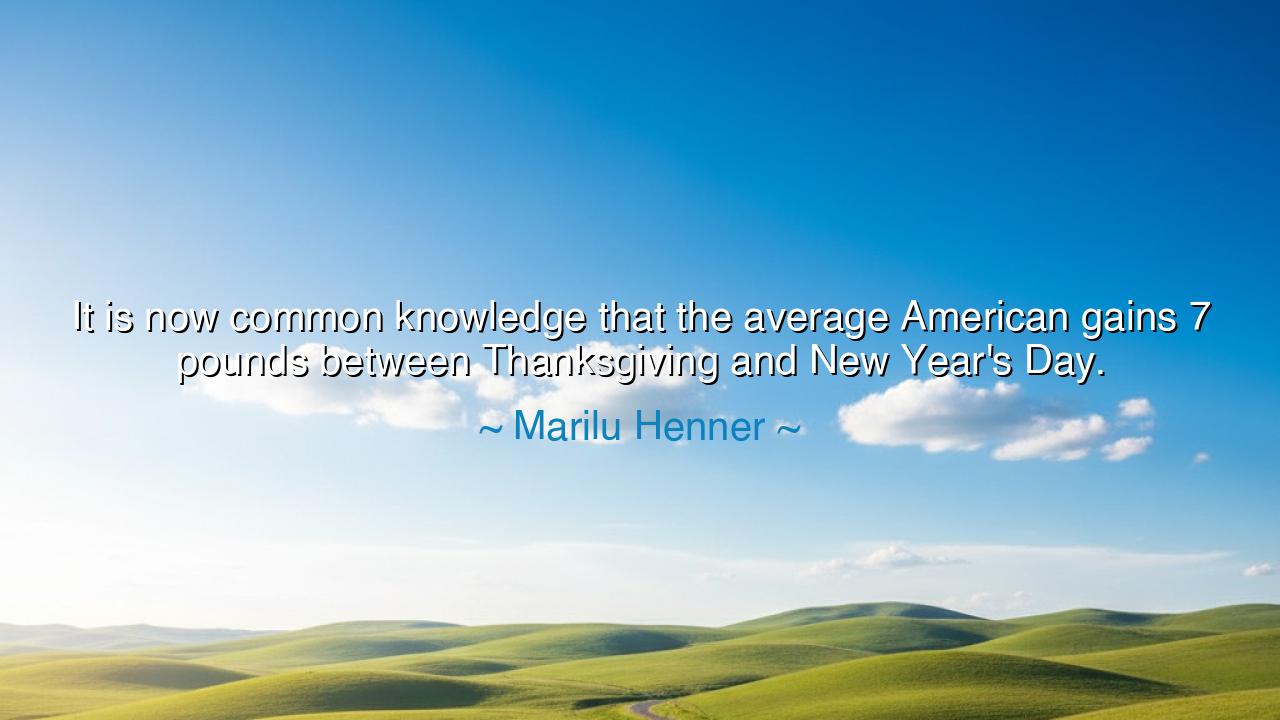
It is now common knowledge that the average American gains 7
It is now common knowledge that the average American gains 7 pounds between Thanksgiving and New Year's Day.






The words of Marilu Henner — “It is now common knowledge that the average American gains 7 pounds between Thanksgiving and New Year’s Day” — may at first seem a simple observation about health, but within them lies a profound reflection on human nature, indulgence, and the rhythm of excess and renewal. In these few words, Henner, a woman known for her discipline, self-awareness, and mastery of memory, reminds us of the eternal struggle between gratification and restraint, between the fleeting pleasure of the feast and the enduring labor of self-care. Her tone, both factual and cautionary, echoes an ancient wisdom: that what we celebrate in abundance, we must later reckon with in balance.
In the style of the ancients, one might say: “The feast is but a mirror for the soul; it shows what it desires, and what it lacks.” Henner’s statement, rooted in modern science yet ancient in spirit, is a commentary on the human tendency to lose measure when joy overflows. The season from Thanksgiving to New Year’s Day is, for many, a festival of abundance — tables heavy with food, gatherings rich in laughter, hearts softened by nostalgia. Yet behind the laughter lurks forgetfulness: we forget moderation, we forget the body’s quiet voice, and we allow indulgence to reign as king. Thus, her “common knowledge” becomes a quiet indictment — not of celebration itself, but of the neglect of mindfulness that too often follows it.
The origin of this quote can be traced to Henner’s advocacy for healthy living and her lifelong dedication to mental and physical clarity. As an actress, author, and health enthusiast, she has spent years teaching others that vitality is not born of denial, but of awareness. Her observation about holiday weight gain is less about numbers than about patterns — how small, unconscious habits accumulate, and how easily comfort becomes captivity. The statistic she shares is emblematic: in a few short weeks of joy, one may undo months of discipline. Thus, Henner’s message becomes less about diet and more about wisdom in times of plenty — a lesson as old as civilization itself.
Consider the story of the ancient Romans, whose Saturnalia — a winter festival of feasting and revelry — once mirrored our own holiday excess. For days they indulged without restraint, allowing slaves to dine as masters and citizens to drown in luxury. Yet even in that society, philosophers like Seneca warned that joy without temperance leads to decay, that the body and the spirit both grow sluggish when fed without measure. What Henner expresses through modern words, the Stoics declared in timeless terms: discipline is the guardian of freedom, and every indulgence carries a shadow.
Her statement also reflects the paradox of modern abundance. We live in an age where scarcity has turned to surplus, yet the wisdom of moderation has been lost. Food, once sacred, is now convenience; celebration, once rare, has become constant. The seven pounds Henner speaks of are not just physical — they are symbolic of spiritual weight, of the burden that comes from losing harmony with ourselves. The body remembers every choice; it records every excess as silently as it does every act of care. In this sense, the holiday table becomes a moral landscape — a test of gratitude, discipline, and foresight.
Yet Henner’s words are not meant to shame, but to awaken. The purpose of knowledge, she implies, is not fear but empowerment. When she calls it “common knowledge,” she reminds us that awareness has already been given — that ignorance is no longer our excuse. What remains is will. To live well is not to refuse joy, but to temper it with gratitude and mindfulness. One can feast and still honor health; one can celebrate and still remain grounded in balance. The feast loses none of its sweetness when seasoned with wisdom.
So let this be the teaching carried forward: be mindful in your moments of plenty, for the true measure of wisdom is not how we endure hardship, but how we govern abundance. When the table is full, remember the hunger of others; when the year is ending, remember the renewal to come. Let each indulgence be met with gratitude, and each pleasure with restraint. For joy that is mindful endures, while joy that forgets itself fades into regret.
In Henner’s modern observation, the ancients would have heard an old truth reborn: that the body is the temple of the spirit, and every excess dishonors both. Thus, as the seasons turn and the holidays return, let her words echo in our hearts — a reminder that the feast and the fast must dance together, and that only in balance can we find the freedom of true well-being.






AAdministratorAdministrator
Welcome, honored guests. Please leave a comment, we will respond soon